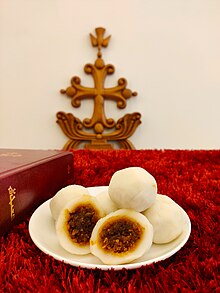|
Kozhukkatta
Kozhukatta (Malayalam: കൊഴുക്കട്ട), Kozhukkattai (Tamil: கொழுகட்டை) or Kudumu (Telugu: కుడుము) is a popular South Indian dumpling made from rice flour, with a filling of grated coconut, jaggery, or chakkavaratti. Kozhukatta, although usually sweet, can sometimes be stuffed with a savory filling. Modak is a similar dish made in other parts of India. PreparationThe dish is prepared by mixing grated coconut with jaggery syrup, placing it inside dumplings of rice flour, and steaming the dumplings. Ghee, cardamom, finely ground roasted rice flour etc. may be added to enhance the taste and flavor of the filling. In Kerala, a variant of kozhukatta made with atta flour (instead of rice flour) and grated coconut is a staple breakfast among some groups. Popular culture In Tamil Nadu, the dish is traditionally associated with the Hindu God Ganesha and is prepared as an offering (naivedhya) on the occasion of Vinayaka Chathurthi. In Kerala, it is popularly associated with Oshana Sunday celebrations of Saint Thomas Christians.[1] It is also eaten as an evening snack with tea or coffee. Kozhukkatta is an important part of several natal customs of the Sri Lankan Tamil community. In Northern and Eastern Sri Lanka, there is a custom involving dumplings whose edges are pressed to resemble teeth being dropped gently on a baby's head while the family wishes for the infant to develop healthy teeth.[2] In eastern areas of Sri Lanka, a smaller version called piḷḷai kozhukkaṭṭai is prepared by female family members for an expectant mother about four months after conception. These sweets are commonly exchanged at weddings as auspicious symbols of "plump" health and fertility.[3] Making
See alsoWikibooks Cookbook has a recipe/module on
References
External linksWikimedia Commons has media related to Kozhukkatta. |
||||||||||||||




